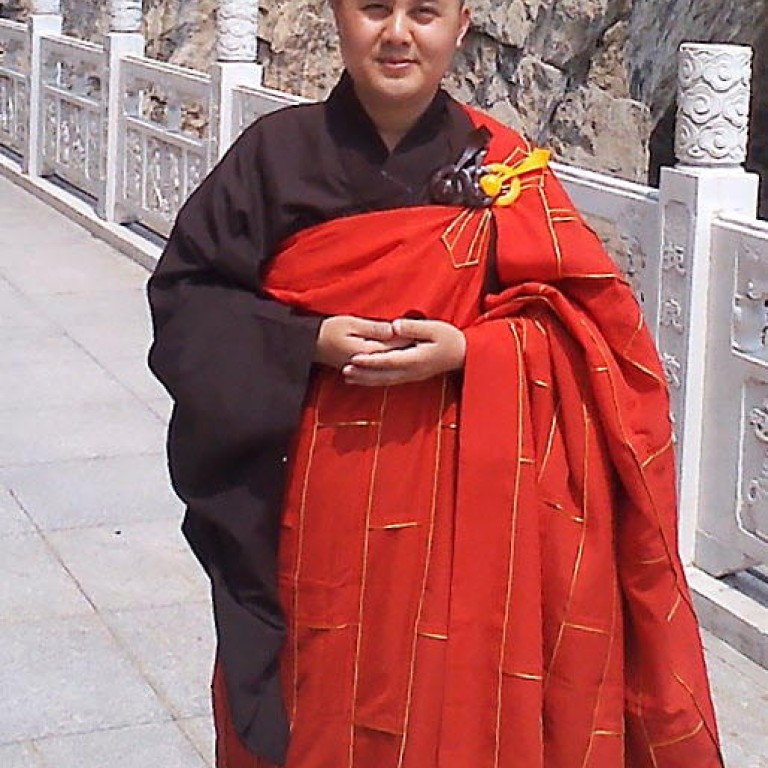
Following in the footsteps of the master
Ex-reporter discovered new way of living from Buddhist teacher, but continues to speak out
Liang Lu and Li Qi began their careers as reporters, navigating the perilous waters of journalism in Beijing and Shenzhen. Not long after they met, they fell in love and married. After writing books about their travels in China and about their own relationship, they met a Buddhist teacher who deeply affected how they view the world, and the purpose of their lives. They decided to divorce, take up new names, and devote their time to living according to the Buddha's precepts, even if that means criticising corrupt abbots who embezzle the wealth of monasteries.
I had been trying a lot of different things before entering into religion. In the 1990s and early 2000s, every Chinese graduate thought being a journalist was ideal, and that there was freedom and honour in being a reporter and monitoring our society. So after I graduated in 2002, I became a reporter. I met Li Qi in Shenzhen in 2005, while we were both working for a local newspaper. We both loved travelling and soon fell in love because we had so much in common. We quit the newsroom and set up a public relations company together in Shenzhen in 2007. We published two books based on our travels and relationship.
In 2008, we met a Buddhist monk, Shengguan Master, through one of our friends. He was a controversial monk who has been travelling across the country, trying to spread his understanding of Buddhism with regular people. He defends human rights and speaks out when he sees injustice, which is unusual on the mainland where the authorities discourage adherents of any religion to propagate teachings outside of their monasteries. At first, we treated him as a friend and listened to his stories, which were inspiring. We then found that Buddhist scriptures and Shengguan's experiences showed us a fresh and unique way to think and live.
In October last year, after we had been studying Buddhism for a few years, Li Qi and I went on a tour and visited dozens of temples in Guangdong, Jiangxi , Fujian , Tibet and Zhejiang . We had many conversations with monks at their monasteries. We found there were different interpretations of Buddhist teachings and how to live, and those in small temples also have their own intensive study of Buddhist practice. Unlike well-known and respected monks in famous temples with a large number of followers, they have a harder time seeing to the needs of their monasteries, let alone propagating Buddhist teachings to the lay public. We were compelled by what we saw. We wanted to fulfil the duty of a Buddhist to persevere in promoting the expression of Buddhism in the world. So, we made the decision after the trip. We got divorced in November and bid farewell to our social life.
We both replaced our lay names with monastic ones. Mine is Guozhi and Li Qi is now Changyi. I visited several temples in Taiwan in March. Originally, I had intended to simply learn and study from as many monks and abbots as I could reach. But I was surprised at the differences between how Buddhism is carried out there and on the mainland. Corrupt practices are widespread in Chinese Buddhism and the religious-affairs departments of many temples on the mainland are defiled by unholy deeds. I found many monks and abbots there embezzling large amounts of cash donations from worshippers. Some abbots have become very rich. To keep their position, they bribe officials in local religious-affairs and united-front departments.
My experiences and the character that I developed as a reporter drove me to speak out and try to make a change. I learned from my trip to Taiwan that abbots there are not appointed by the government, but elected. And their monasteries implement the principle of financial disclosure. After coming back from Taiwan, I wrote a public letter to abbots of Chinese temples. In the letter, I called on the abbots to make public the details about their personal assets, and contribute to the effort to end the appropriation of monastery assets by officials, and to end their interference in temple affairs. I also wanted to encourage the practice of abbots being elected by monks and followers. In April, I started to send the letters to many well-known and respected abbots. But most of them did not pay any attention. Suddenly, I realised that many of them have a vested interest in keeping the game going. In June, I visited small monasteries in remote areas in Jiangsu , Beijing and Shanxi and shared my letter with monks and abbots there. Many of them agreed with my views and said they would like to pursue my ideas. Next month, I will put online a list of the monasteries that want to make their personal assets and donations public.
Many internet users criticise or blame me, saying I'm not pure enough to be a monk, that I should focus on meditation and abiding by the commandments of monkhood. Some even say I'm a fake monk because, in their eyes, a monk should not take part in political or religious reform. But I never feel regret or discouraged because of their accusations. But this is just part of my efforts to practice Buddhism and spread my understanding of its teachings.

